Key Stats:
Location: Amherst, Massachusetts
Self-operated
Student Population: ~32,000
50,000 Meals Served Daily
4 Dining Commons
30+ Retail Locations
Two Food Trucks
Peanut Usage: (Below list is not exhaustive.)
Across locations, menus and dayparts
- Sauces and Marinades
- Trail mixes
- Desserts
- Noodle Bowls
- Chicken Satay
- Pad Thai
- Peanut Butter Smoothies
- African Peanut Stews
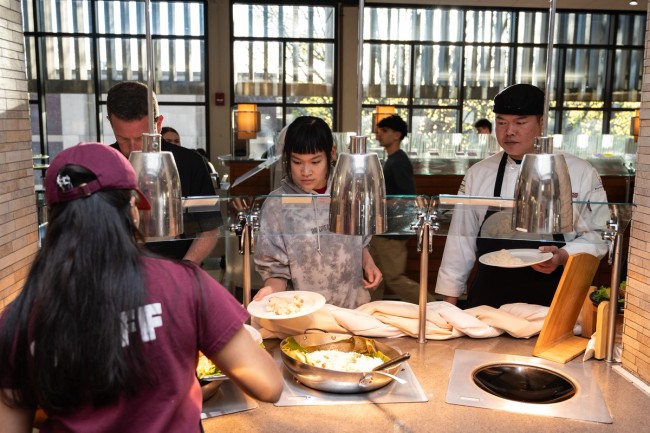
A Model for Serving Allergens Without Exclusion
At a time when many universities have moved to restrict peanut-containing foods out of concern for food allergies, UMass Amherst stands as a national model for how to embrace peanuts as a valued, culturally essential, and safe menu ingredient.
They do it exceptionally well. UMass Amherst is ranked #1 in Best Campus Food by The Princeton Review for eight consecutive years, a testament to the school’s commitment to balancing flavor, safety, and inclusion. Their approach is rooted in education, transparency, and cross-functional collaboration—and it has earned them praise from students, parents, and foodservice professionals alike.
This is the story of how one of the largest dining programs in the country proves that food allergy safety and menu inclusion don’t have to be at odds.
Peanuts Have Always Had a Place at the Table
Unlike some colleges that have banned or limited peanuts, UMass Amherst has never removed them from their menus. Instead, they chose to build robust systems that prioritize food allergen management alongside menu inclusion.
“Peanuts are a nutrient-dense, sustainable, and affordable protein source,” says Garett DiStefano, Director of Dining Services. “They play a vital role in diverse cuisines and contribute to an inclusive, well-rounded menu.”
This perspective is shared across the UMass team.
Associate Director of Nutrition Sabrina Hafner adds, “We don’t ban peanuts in any of our dining operations. Instead, we teach students with allergies how to navigate safely, ask questions, and advocate for themselves—skills they’ll need long after college.”
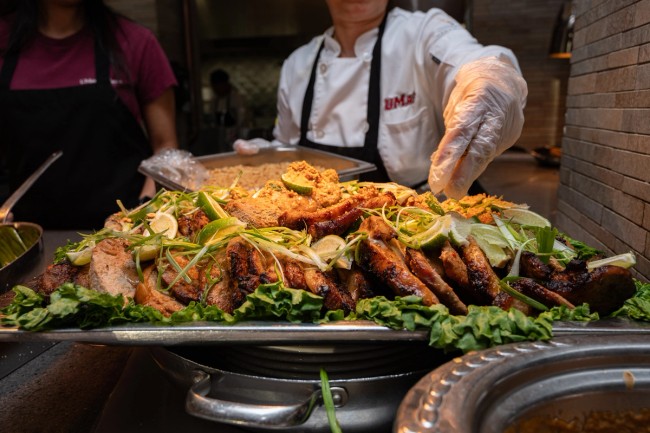
Global Cuisine, Student Demand, and Culinary Integrity
UMass serves over 50,000 meals per day across four dining commons, 30+ retail locations, and multiple food trucks. With such a large and diverse population, authenticity in menu development isn’t just a culinary goal—it’s a cultural responsibility.
“We have a big population of international students—from India, Southeast Asia, and China—where peanuts are integral to their cuisine,” says Executive Sous Chef Caleb Pham. “We try to be authentic with the food we serve them every day. If I took away peanuts, I’d have a riot on my hands.”
Peanuts appear across all dayparts and platforms—from sauces and marinades to smoothies, trail mixes, desserts, and noodle bowls. Dishes like chicken satay, Pad Thai, peanut butter smoothies, and African peanut stews are not only served, but celebrated.
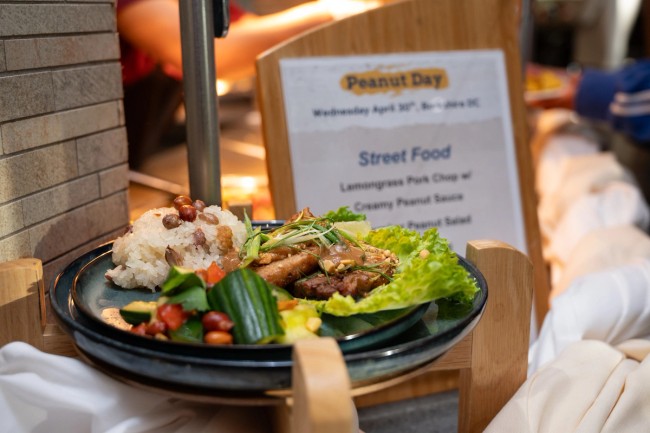
Student response has been overwhelmingly positive.
“Peanuts make these dishes authentic,” Pham says. “And that authenticity is what students recognize and appreciate.”
Layered Systems That Make It Safe
UMass doesn’t rely on a single fix or isolated allergen-free dining zone. Instead, they’ve built a multi-tiered system of prevention, communication, and empowerment to manage food allergy risk.
- Preventing Cross-Contact
- Designated prep zones and separate equipment for peanut-containing recipes
- Storage protocols and clear labeling of peanut ingredients
- Pre-meal huddles where chefs review allergen-containing recipes with staff
- Rigorous sanitation procedures between preparations
- Clear Allergen Communication
- Every dish is clearly labeled on in-hall signage, the UMass Dining website, and the UMass Dining app
- Students can filter menus by allergen and dietary needs in real-time
- Labels are managed centrally to ensure accuracy across operations
- Staff Training & Response
- All culinary and front-of-house staff undergo annual allergen training with testing
- Chefs receive intensive food safety instruction for managing allergens,including peanuts
- Dining teams are trained to respond to allergic reactionstimely and effectively and work in coordination with health services
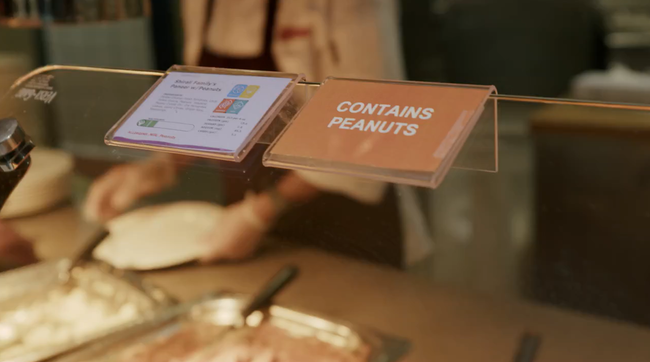
Personalized Support for Students with Allergies
UMass offers a variety of proactive support services for students navigating food allergies, including peanuts.
- Students can book one-on-one consultations with campus dietitians
- Tours and personalized nutrition plans are available for students and families
- Students who need special accommodations are referred to disability services and gain access to a mobile ordering system for made-to-order allergy-safe meals
Importantly, out of the roughly 2,200 students with food allergies, only 35 students with peanut allergies have needed these special accommodations. The rest safely dine throughout the system with the existing safeguards in place.
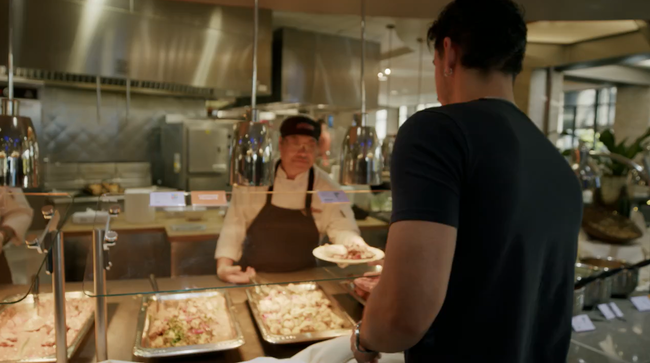
A Culture of Transparency from Day One
The allergy support system begins before students even step on campus.
During new student orientation registration, students are asked about food allergies. That data goes straight to the nutrition office, which reaches out before orientation to educate students on:
- How to navigate dining halls safely
- How to use the mobile app and menu filters
- Who to contact with questions
- How to access personalized help
“Creating a culture of safety starts with proactive communication,” says Hafner. “We make sure students, and their parents, feel supported from day one.”
Results: Safety, Satisfaction, and Confidence
The impact of this inclusive approach is clear:
- UMass maintains exceptionally high student satisfaction and meal participation, with no indication of increased allergy incidents related to peanut service
- Peanut-containing foods remain among the most popular menu items, especially dishes with global flavors
- Students with allergies report feeling empowered rather than excluded
“Our model shows that safety and flavor don’t have to be mutually exclusive,” says DiStefano. “We want all students to have confidence in the food we serve—whether they have allergies or not.”
That sense of belonging is a core value of UMass Dining’s approach.
“Our dining halls are where students spend time with friends—it’s the heart of campus life,” says Chris Howland, Chief Procurement Officer. “We don’t want students with allergies to have to eat somewhere else. Everyone should feel welcome and safe, wherever they choose to dine.”
Advice for Other Campus Dining Programs
UMass’s advice for universities hesitant to serve peanuts?
- “Don’t default to fear,” says Chef Pham. “With proper protocols, you can serve peanuts safely—and the payoff in flavor, authenticity, and student satisfaction is worth it.”
- “Build a cross-functional team,” says Hafner. “Dining, accessibility services, health services, new student orientation—we all need to work together.”
- “Prioritize transparency,” she adds. “Clear labeling, menu filters, trained staff—these are what empower students with allergies to eat safely.”
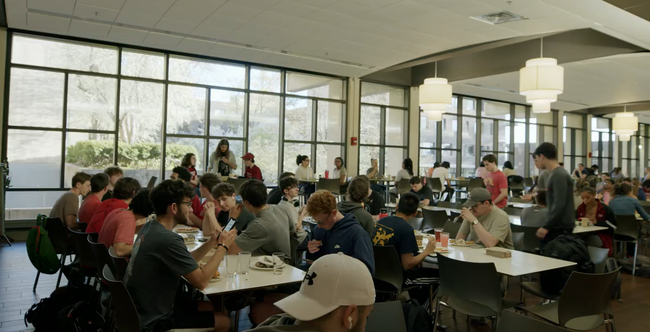
Looking Ahead
UMass has no plans to scale back on peanuts. In fact, they’re continuing to:
- Expand globally inspired peanut recipes
- Offer more pre-packaged peanut snacks in grab-and-go and retail locations
- Improve digital allergen tracking tools
- Hold regular student feedback sessions to refine their offerings
Their goal is to meet students where they are—culturally, nutritionally, and safely.
��“Serving peanuts isn’t just about the food—it’s about inclusion, authenticity, and doing right by all our students,” says DiStefano.“ We’re proud to lead by example.”
For more information on safely serving peanuts in college and university dining, go here.
